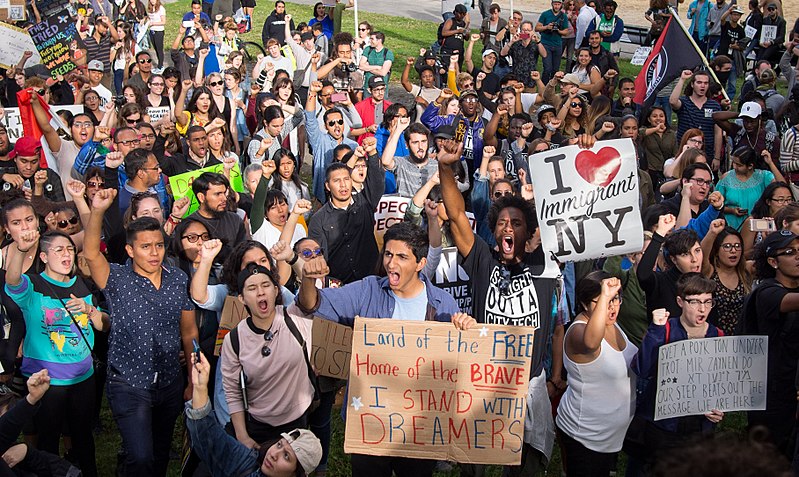Immigration Debate Disrupts the US Government

Photo By Rhododendrites, March and rally/protest in response to the rescission of Deferred Action For Childhood Arrivals (DACA) in New York City on September 9, 2017. The march began in Columbus Circle by the Trump International Hotel and Tower, went up Central Park West and turned into Central Park, via Wikimedia Commons/ CC 4.0
On January 22, Congress passed a three week spending bill to end the federal government shutdown after Democrats and Republicans were unable to come to an agreement concerning funding for Trump’s infamous wall and finding a real long-term solution for DACA. The bill stops funding the federal government on February 8, a deadline which has arrived.
Immigration issues have developed into a heated debate on Capital Hill and across the country over the past year. A little over a year ago when Trump was inaugurated, anti-immigration sentiments filled the political air. As part of this rhetoric, Trump has boasted time and time again about how he is going to ensure that a wall will be erected on the US-Mexico border. Additionally, this past fall he decided not to renew Obama’s DACA bill, and it is now set to expire on March 5, 2018. This decision has left hundreds of thousands of young Americans in unimaginable amounts of stress and fear.
The primary function of the short-term spending bill is to keep the federal government open until the next spending bill deadline. In addition to keeping the government open, the bill provides funding for the Children’s Health Insurance Program (CHIP) for six years and it delays or ends several taxes imposed by the Affordable Care Act. The CHIP renewal is a win for the Democrats, but the deal overall is less favorable as there was only a verbal agreement to find a solution for DACA which is the Democrats’ chief concern at the moment.
DACA, or Deferred Action for Childhood Arrivals, is an executive order by Obama that protects undocumented immigrants who arrived in the United States as a child from deportation and provides them with a work permit which can be renewed every two years. Currently, there are about 800,000 DACA recipients in the country. Democrats have stood defiantly alongside DACA recipients, refusing to stop their efforts until a real long-term solution has been agreed upon to ensure the safety and livelihoods of DACA recipients. Just yesterday, Nancy Pelosi talked for eight hours and seven minutes on the House floor declaring she will not vote for a spending bill that does not include a renewal of DACA. Republicans have tried to shift the blame for the government shutdown on the Democrats by declaring that they are prioritizing the wrong issues and not keeping American citizens’ best interests at heart. Trump tweeted on January 20 that Democrats are “far more concerned with Illegal Immigrants than they are with our great Military or Safety at our dangerous Southern Border.” However, it has been found that more Americans blame Republicans and not Democrats for the federal government shutdown.
When the short-term spending bill was passed, Senate Majority Leader Mitch McConnell promised Democrats that there would be a “level playing field” to discuss the immigration issue in February if an agreement had not been made yet. However, many Democrats were skeptical of his promise and were cautious to trust him. As put by the Sierra Club’s executive director, Michael Brune, “…you can’t trust Mitch McConnell. His promises are empty from the start.” Likewise, Senate Minority Leader, Chuck Schumer, worried that “there’ll be no incentive to negotiate, and we’ll be right back here in a month with the same problems at our feet.” Reluctantly, Democrats helped pass the short-term spending bill, hoping that McConnell would keep his word. Senator Richard J. Durbin (D-Ill.) is one of the Democrats who is hopeful for successful future negotiations, saying “To all the Dreamers who are watching today: Don’t give up.”
Another side of the immigration debate is Trump’s US-Mexico border wall, which he is adamant about finding funding for since it was one of his big campaign promises. The first phrase of Trump’s wall is expected to cost the US $18 billion. Trump’s wall used to be a non-starter for Democrats, and they were clear that they were not going to approve such a fiscally irresponsible endeavor that would most likely not cause any drastic impact on illegal immigration. However, recently, Democrats have felt the urgency of the DACA issue and seem to be more willing to concede to Trump’s demands for funding for the wall in exchange for protection of DACA recipients.
Presently, legislators are losing hope for a long-term deal to be created by tonight’s deadline, and they are already getting prepared for yet another short-term spending bill. This would be the fifth continuing resolution and would fund the federal government through March 22. Hopefully, Democrats will keep to their word about fighting for DACA recipients and not agree to the short-term spending bill without a solution for DACA being found. This may mean Democrats agreeing to some amount of funding for the border wall. No one is sure what will happen, but as college students and concerned residents of the country, we can urge our representatives to do the right thing and fight for proper immigration policy reform.




